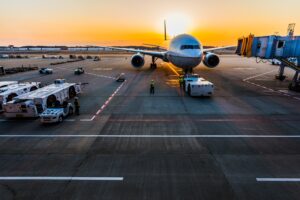Aviation emissions must peak by 2030 to fulfil Paris Agreement
Airline emissions will need to reach a peak by 2030 if Paris Agreement climate goals are to be fulfilled, according to the International Council on Clean Transportation (ICCT).
Analysis by the organisation found global aviation could reach near net-zero by 2050, with the most optimistic scenario seeing the industry reduce emissions in line with 1.75°C warming.
But the ICCT has warned immediate and aggressive action is required to reach these targets, as research shows strong government intervention and new technology will effectively reduce CO2 levels.
Lead author of the ICCT study, Brandon Graver, said: ‘The all-in strategy to deploy clean planes and fuels cuts emissions even deeper than we expected. But public policies will be needed to peak emissions as early as 2025 to put aviation on a 1.75 °C pathway.’

Three decarbonisation scenarios were studied – Action, Transformation and Breakthrough – alongside a baseline.
All had varying assumptions of traffic growth, fuel efficiency, aircraft improvements and sustainable technology developments.
In the Action and Transformation scenarios, government efforts and new technologies flatten and halve 2050 CO2 emissions compared to 2005 levels.
Whereas, in the Breakthrough model early and aggressive government action led to widespread investment in zero-carbon aircraft and fuels, leading to a peak in emissions by 2025.
By 2050 CO2 fell by 94% below 2019 levels due to the use of sustainable fuels, improved energy efficiency and limited demand reduction.
It was discovered that in all three models sustainable aviation fuel (SAFs) accounted for the largest CO2 reduction potential, from between 59% and 64%.
Currently, SAFs account for less than 0.1% of jet fuel use, while improvements in aircraft models and industry operations would also reduce CO2 emissions by a third.
The report compared total CO2 emissions between 2020 and 2050 to 1.5°C, 1.75°C and 2°C global carbon budgets and all three scenarios revealed that aviation emits as much CO2 as would be allowed under the Paris Agreement by 2030.
It was recommended that SAF mandates, low carbon fuel standards, carbon taxes or a frequent flyer levy be installed to bridge price gaps between alternative and fossil fuel planes.
Co-author of the study and ICCT’s aviation program director, Dan Rutherford, said: ‘It’s exciting to see industry developing new technologies that can dramatically reduce aviation emissions. But to fully meet the ambitions of the Paris Agreement, either atmospheric carbon removals or curbs to traffic growth will be needed.’
Photo by VOO QQQ















